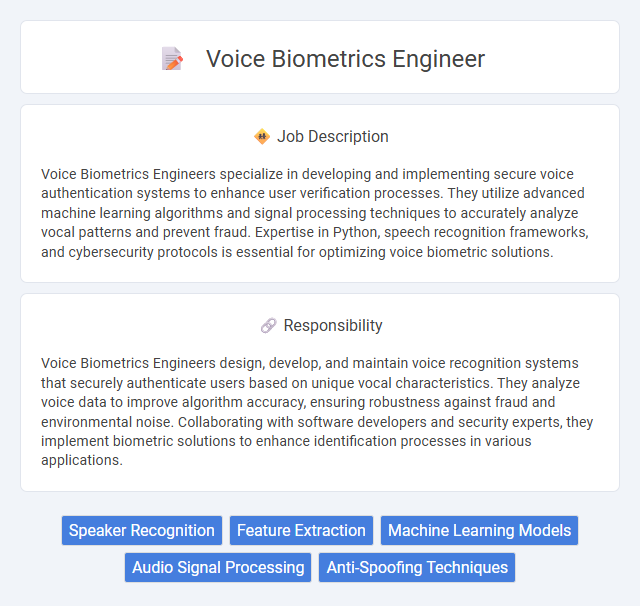
Voice Biometrics Engineers specialize in developing and implementing secure voice authentication systems to enhance user verification processes. They utilize advanced machine learning algorithms and signal processing techniques to accurately analyze vocal patterns and prevent fraud. Expertise in Python, speech recognition frameworks, and cybersecurity protocols is essential for optimizing voice biometric solutions.
Individuals with strong analytical skills and a background in signal processing or machine learning are more likely to thrive as Voice Biometrics Engineers. Those comfortable working with audio data, algorithms, and security protocols will probably find this role suitable. People lacking technical expertise or interest in voice recognition technology might face challenges in adapting to the job requirements.
Qualification
Voice Biometrics Engineers typically require a strong background in signal processing, machine learning, and software development, often holding degrees in computer science, electrical engineering, or related fields. Proficiency in programming languages such as Python, C++, and experience with voice recognition toolkits like Kaldi or TensorFlow is essential. Knowledge of speaker verification algorithms, acoustic modeling, and data analytics enhances the ability to develop and optimize secure voice authentication systems.
Responsibility
Voice Biometrics Engineers design, develop, and maintain voice recognition systems that securely authenticate users based on unique vocal characteristics. They analyze voice data to improve algorithm accuracy, ensuring robustness against fraud and environmental noise. Collaborating with software developers and security experts, they implement biometric solutions to enhance identification processes in various applications.
Benefit
Voice biometrics engineers likely enjoy the benefit of working on cutting-edge technology that enhances security and user authentication processes. They probably experience opportunities for career growth due to increasing demand for biometric solutions in various industries. Their role might also provide a sense of fulfillment by contributing to safer and more efficient digital interactions.
Challenge
Voice Biometrics Engineer roles likely involve tackling complex challenges related to accurately identifying individuals through unique vocal features. These positions probably demand innovative approaches to overcome issues such as background noise interference, voice variability, and spoofing attempts. Continuous advancements in machine learning and signal processing might be essential to enhance system reliability and security.
Career Advancement
Voice Biometrics Engineers develop and optimize voice recognition systems, leveraging expertise in machine learning, signal processing, and natural language processing to enhance security and user experience. Career advancement opportunities include roles such as Senior Voice Biometrics Engineer, Voice Authentication Architect, and Director of Biometric Systems, with a growing demand in industries like cybersecurity, finance, and telecommunications. Gaining proficiency in AI-driven biometrics and staying updated on regulatory compliance significantly boosts prospects for leadership and specialized research positions.
Key Terms
Speaker Recognition
Voice Biometrics Engineers specializing in Speaker Recognition develop and optimize algorithms that analyze unique vocal features to verify and authenticate individual identities. They utilize machine learning models, signal processing techniques, and neural networks to enhance accuracy and reduce false acceptance rates in voice identification systems. Expertise in acoustic feature extraction, voiceprint modeling, and integration with security protocols is critical for advancing biometric authentication technologies.
Feature Extraction
Voice Biometrics Engineers specialize in extracting unique vocal features such as pitch, tone, and spectral patterns to enhance identity verification systems. Utilizing advanced signal processing techniques and machine learning algorithms, they optimize feature extraction for higher accuracy and resistance to spoofing. Their expertise directly improves authentication security in applications like banking, call centers, and mobile devices.
Machine Learning Models
Voice Biometrics Engineers design and implement advanced machine learning models to accurately identify individuals based on unique vocal traits. They optimize deep learning algorithms for speaker recognition, leveraging neural networks to enhance system performance in real-time applications. Expertise in signal processing, feature extraction, and model training using large-scale voice datasets is essential for developing robust voice authentication systems.
Audio Signal Processing
Voice Biometrics Engineers specializing in Audio Signal Processing develop advanced algorithms to analyze unique vocal characteristics for secure authentication systems. They leverage techniques such as feature extraction, noise reduction, and spectral analysis to enhance voice recognition accuracy in diverse acoustic environments. Expertise in machine learning and digital signal processing frameworks enables optimization of real-time voice verification and fraud detection technologies.
Anti-Spoofing Techniques
Voice Biometrics Engineers specializing in Anti-Spoofing Techniques develop advanced algorithms to detect and prevent fraudulent voice authentication attempts. Their work involves analyzing vocal patterns, acoustic features, and behavioral biometrics to ensure system resilience against synthetic voice attacks, replay attacks, and voice morphing. Expertise in machine learning models and signal processing is critical for enhancing the security and accuracy of voice biometric systems in diverse environments.
 kuljobs.com
kuljobs.com